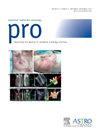Experience From an Early Exposure Education Program in Radiation Oncology for High School and Undergraduate Students
IF 3.4
3区 医学
Q2 ONCOLOGY
引用次数: 0
Abstract
Exposure to radiation oncology (RO), which is a small and highly subspecialized field of oncology, during undergraduate or medical education is often limited. Coupled with reduced elective exposures during the COVID-19 pandemic, unsubstantiated concerns regarding the RO job market have led to a noticeable decline in residency applications and medical students who express an interest in the field. Here, we describe a summer education program piloted in our RO department at a comprehensive cancer center to provide premedical school students (ranging from high school to postbaccalaureate) early exposure to the specialty through clinical shadowing, research opportunities, journal club, and formal didactic lectures. Pre- and postprogram surveys were administered to these students to evaluate the change in knowledge in RO. A total of 8 students participated in the program. We found an increase in understanding of the specialty, high levels of interest in considering RO as a career, and positive feedback regarding the program overall. This study supports the role of early exposure and education in stimulating interest in future medical students to pursue RO as a career. Future efforts are needed to further develop and evaluate these education programs as well as disseminate the program more broadly.
高中生和本科生早期接触放射肿瘤学教育计划的经验。
放射肿瘤学(RO)是肿瘤学中规模较小且高度亚专业化的领域,但在本科或医学教育中接触该领域的机会往往有限。再加上 COVID-19 大流行期间选修课程的减少,人们对放射肿瘤学就业市场的担忧没有得到证实,导致住院医师申请和对该领域感兴趣的医学生人数明显减少。在此,我们介绍了一个暑期教育项目,该项目在综合癌症中心的病理生科室试行,通过临床见习、研究机会、期刊俱乐部和正式的教学讲座,让医学院预科学生(从高中到学士后)尽早接触该专业。对这些学生进行了项目前和项目后调查,以评估他们在 RO 知识方面的变化。共有八名学生参加了该计划。我们发现,学生对该专业的了解有所加深,对考虑将区域研究作为职业的兴趣很高,并对该计划的整体情况给予了积极评价。这项研究支持早期接触和教育在激发未来医学生将区域研究作为职业的兴趣方面所起的作用。今后需要进一步开发和评估这些教育项目,并更广泛地推广该项目。
本文章由计算机程序翻译,如有差异,请以英文原文为准。
求助全文
约1分钟内获得全文
求助全文
来源期刊

Practical Radiation Oncology
Medicine-Radiology, Nuclear Medicine and Imaging
CiteScore
5.20
自引率
6.10%
发文量
177
审稿时长
34 days
期刊介绍:
The overarching mission of Practical Radiation Oncology is to improve the quality of radiation oncology practice. PRO''s purpose is to document the state of current practice, providing background for those in training and continuing education for practitioners, through discussion and illustration of new techniques, evaluation of current practices, and publication of case reports. PRO strives to provide its readers content that emphasizes knowledge "with a purpose." The content of PRO includes:
Original articles focusing on patient safety, quality measurement, or quality improvement initiatives
Original articles focusing on imaging, contouring, target delineation, simulation, treatment planning, immobilization, organ motion, and other practical issues
ASTRO guidelines, position papers, and consensus statements
Essays that highlight enriching personal experiences in caring for cancer patients and their families.
 求助内容:
求助内容: 应助结果提醒方式:
应助结果提醒方式:


